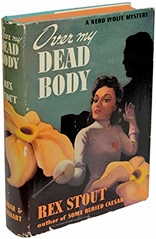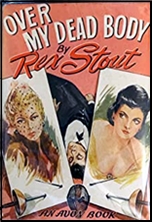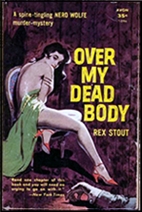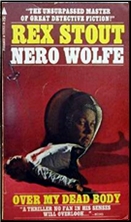Fri 17 Mar 2023
Nero Wolfe on Page and (Small U.S.) Screen: Over My Dead Body, by Matthew R. Bradley.
Posted by Steve under Reviews , TV mysteries[16] Comments
Over My Dead Body
by Matthew R. Bradley.

Rex Stout’s seventh Nero Wolfe novel, Over My Dead Body (1940), was one of several to be serialized or, as in this case, abridged in The American Magazine (September 1939). Since The League of Frightened Men (1935), Stout had produced the spin-offs The Hand in the Glove (1937), introducing early female P.I. and occasional employee Theodolinda “Dol†Bonner, and Red Threads (1939), which featured Inspector Cramer. In The Rubber Band (1936), he mentioned the painting of Sherlock Holmes hanging over Archie’s desk; brought Purley Stebbins onstage at last; and introduced Police Commissioner Hombert, D.A. Skinner, the hated Lt. George Rowcliff, and London “snoop†Ethelbert Hitchcock.
The Red Box (1937) offers a murder actually committed, via poisoned aspirin, in Wolfe’s office, and an early example of the climactic gathering of suspects there. Also introduced in, respectively, Too Many Cooks (1938) and Some Buried Caesar (1939) are his lifelong friend, Marko VukÄić, the owner of Rusterman’s Restaurant, with whom Wolfe “hunted dragonflies…in the mountains†and is on a rare first-name basis, and Archie’s sometime romantic interest, heiress and socialite Lily Rowan, who dubs him Escamillo — the torero in Georges Bizet’s Carmen (1875) — after a run-in with a bull. All four were adapted in a 1969-71 Italian TV series, featuring Tino Buazzelli as Wolfe and Paolo Ferrari as Archie.
Well, now that we’re all caught up, Over My Dead Body opens with a visit from Carla Lovchen, who — as Archie tells Wolfe— “seems to be named after a mountain. The Black Mountain. Mount Lovchen. Tsernagora. Montenegro, which is the Venetian variant of Monte Nero…â€

Her friend Neya Tormic, also a pseudonymous immigrant from Zagreb employed at the dancing and fencing studio of Nikola Miltan (whom Wolfe has met at Marko’s table), has been accused of stealing diamonds from a man’s pocket. Unnerved when she says “Hvala Bogu†(Thank God), Wolfe orders her ejected; “I have skedaddled, physically, once in my life, from one person…a Montenegrin woman…many years ago.â€
Barely an hour later, Wolfe is visited and reminded by a G-man, Stahl, about the Federal statute “requiring persons who are agents in this country of foreign principals to register with the Department of State.†He says that he is not, although as a boy he served as an agent of the Austrian government and in the Montenegrin army, noting that he “starved to death in 1916,†then walked 600 miles to join the A.E.F. when the U.S. entered the war.
Wolfe states that he has neither communicated with nor provided money to Prince Stefan Donevitch of Zagreb (the nephew of Old Peter, dying in Paris, whom he knew long ago), but has contributed to both the Loyalists in Spain and the League of Yugoslavian Youth.
Wolfe tells Stahl, “I was born in this country,†flatly contradicting a previous statement that “I wasn’t born here†(Too Many Cooks) and a reference to “my boyhood in Europe†(Some Buried Caesar). He is, in fact, a Montenegrin; Rex Stout’s authorized biographer, John McAleer, attributed this retcon to “violent protests from The American Magazine, supported by [publisher] Farrar & Rinehart,†but “that even in 1939 Wolfe was irked by the FBI’s consuming curiosity about the private business of law-abiding citizens [so he thus] felt under no constraint to tell the truth about himself when interrogated by Stahl.†No, there won’t be a quiz later on, but this stuff will be important as the series progresses.

In the copy of United Yugoslavia Carla perused while awaiting his descent from the plant rooms, Wolfe finds a 1938 document. It empowers Stefan’s wife, Princess Vladanka, to talk and act in his name “in all financial and political matters and claims pertaining to me and to the Donevitch dynasty, with particular reference to Bosnian forest concessions and to the disposal of certain credits at present in the care of Barrett & De Russy, bankers of New York.†Wolfe sums up the “Balkan mess†thus: “The regent who rules Yugoslavia [then including Montenegro] deviously courts the friendship of certain nations….Prince Stefan…is being used by certain other nations, and…using them for his own ambition.â€
Wolfe mails the document to freelance P.I. Saul Panzer when Carla reappears, claiming that Neya is his vanished and adopted daughter (unseen since she was 3) and producing his signed adoption record, which he pockets, then solicits the details. Hired with Carla via an introduction by Donald Barrett, son of banker John P., Neya denies being seen by fencing student Nat Driscoll returning his suit coat to his locker, and was searched to no avail by Mrs. Jeanne Miltan. Belinda Reade and a dancing client, Ted Gill, refute Neya’s claim that she was then giving an épée lesson to Percy Ludlow, who asserts that she was getting cigarettes from his identical coat, mistaken for Driscoll’s, in an adjoining locker.

Driscoll appears with lawyer Thompson, who retracts the charge — saying he’d forgotten his secretary took the gems to a jeweler to be set in a bracelet — but Archie advises Neya not to sign the quittance he produces. Chaos erupts as Jeanne is refusing him permission to ask the porter, Arthur, about stubs and ashes (“just curiousâ€) in the room where Neya fenced with Ludlow, found with an épée stuck through his body. Its blunt point does not bear a col de mort (collar of death) stolen from Nikola’s office…which Archie discovers, upon returning home, in his coat pocket, rolled in a woman’s canvas gauntlet; at Wolfe’s to ask Archie about fleeing the crime scene, Cramer learns of three Feds descending on it.
He lists 10 suspects with no apparent motive; one of them, Rudolph Faber, alibied Neya, last to see Ludlow alive, and comes to ask Wolfe’s interest in her, departing after he fails to retrieve the document while alone in the office. Another suspect, couturière Madame Zorka, calls to say that she saw Neya put something in Archie’s coat and plans to tell the police, so Wolfe tries to bring them together with Cramer, who has Purley fetch Neya as Carla tags along, also revealing Ludlow and Faber to be confidential agents of the British and German governments, respectively. Zorka has skipped, but Neya admits finding the gauntlet in her robe’s pocket and transferring it to Archie’s, because he was there to help.

The roomies leave with Wolfe’s promise to return both papers to Neya that day, when she hopes her “political errand†will be done. Then Donald arrives, forced by Wolfe—under threat of exposing his designs on Yugoslav property—to let Archie collect Zorka, stashed at his love nest with Belinda, tipsy and déshabillé, but she escapes the brownstone during the night, which is reported to Cramer. Wolfe orders Archie to give Carla the document in Neya’s presence, yet in the flat they find Carla gone and Faber dead, so having gotten it back from Saul, Archie has fellow operative Fred Durkin, who was tailing them, return it to Wolfe, mindful of the thorough frisking the police will give him when they’re called.
Back home, John P. comes and goes after Wolfe refuses an offer to hire him, and Zorka is pulled in by Cramer, admitting when confronted with evidence located by Saul that she is Pansy Bupp of Ottumwa, Iowa, backed by Donald. After further machinations, we learn that Neya, the incognito Vladanka, killed Ludlow, who knew she was in cahoots with the Barretts in dealing with the Nazis, and Faber, who tried to blackmail her. When she goes after Wolfe with a dagger, he kills her with a beer bottle (shades of Fer-de-Lance); Carla, accompanying her due to dependence on the Donevitch family, is really Wolfe’s adopted daughter, and he intends to help when she announces her decision to remain in America.

Over My Dead Body was the earliest work in the canon to be adapted for the small screen (at least in the U.S.), as the two-part first-season finale of A&E’s A Nero Wolfe Mystery. “Over My Dead Body†(7/8 & 15/01) was directed by star Timothy Hutton, who played Archie opposite Maury Chaykin’s Wolfe, and served as an executive producer; scenarist Janet Roach, in her only series entry, shared an Oscar nomination with Richard Condon when the latter’s novel Prizzi’s Honor (1982) was filmed by John Huston in 1985. The series boasted handsome period settings, exclusively Stout-based material, and a cast of more than twenty repertory players rotating in the roles of killers, victims, and suspects.
Here, they embody the killer, Neya (Francie Swift); the victims, Ludlow (James Tolkan) and Faber (Richard Waugh); and suspects Carla (Kari Matchett), Zorka (Debra Monk), Jeanne (Nicky Guadagni), Nat Driscoll (Hrant Alianak), Belinda (Dina Barrington), and Donald (now Duncan; Boyd Banks). Other members include George Plimpton (as John Barrett), Robert Bockstael (Stahl), and David Schurmann (Thompson), with a two-time guest star, Ron Rifkin, as Nikola. The remaining regulars are Cramer (Bill Smitrovich), assistant Purley (R.D. Reid), cook/butler/majordomo Fritz Brenner (Colin Fox), and “the ’teersâ€: Saul (Conrad Dunn), Orrie Cather (Trent McMullen), and Fred (Fulvio Cecere).

A collaborator with Alan J. Pakula on such films as Klute (1971) and The Parallax View (1974), series composer Michael Small gives his score a suitably Balkan feel, heavy on cimbalom and violin. Roach hews closely to Stout while understandably omitting, for example, Archie’s encounter with Arthur (Peter Mensah) — in the novel a literally eye-rolling caricature, decidedly un-P.C. by today’s standards — as he flees the studio. The comic element is played up as Wolfe conceals the gauntlet and col de mort inside a loaf of hollowed-out Italian bread, disguised as a cake with chocolate icing, and then returns them to Archie’s coat to be “discovered†in Cramer’s presence at the end of the first half.
Curiously, despite the scripted name change, the younger Barrett is playfully referred to as “Donnybonny,†as he is in the novel; Plimpton, who brings a properly patrician air to his father, was the “participatory journalist†whose book Paper Lion (1966), filmed with Alan Alda in 1968, depicts his tryout with the NFL’s Detroit Lions. In an odd directorial choice, separate encounters in Wolfe’s office with Barrett, Cramer, and Zorka are intercut into a montage that throws continuity to the winds. Over My Dead Body was adapted in 2012 on another Italian series, with Francesco Pannofino as Wolfe and Pietro Sermonti as Archie, as were Fer-de-Lance, The Rubber Band, The Red Box, and other books by Stout.
— Copyright © 2023 by Matthew R. Bradley.
Up next: “Booby Trapâ€
Editions cited:
The Rubber Band, The Hand in the Glove, Some Buried Caesar, Over My Dead Body: Bantam (1982, 1983)
The Red Box, Too Many Cooks, Red Threads: Pyramid (1963, 1964)
Online sources:
March 17th, 2023 at 4:00 pm
The Hand in the Glove was also made into a (TV) movie, reviewed here: https://mysteryfile.com/blog/?p=15776
March 17th, 2023 at 11:42 pm
I barely remember the movie, much less the review, but all in all, to save everyone the trouble of following the link and reading it, no, I didn’t think the movie was very good.
And, no, I haven’t yet read the book.
March 17th, 2023 at 7:22 pm
Exhaustive, in the best sense, and entertaining discussion of Wolfe and company in print and on screen. Bravo.
March 17th, 2023 at 8:19 pm
If I could be any fictional character in essence, it would be Archie Goodwin, especially as incarnated by Timothy Hutton in the series. That wardrobe, be still my beating heart. But I say “in essence†because I would never be able to put up with Wolfe, not for a week, let alone years. In one way, Archie always seems like a prisoner in the brownstone.
March 17th, 2023 at 11:44 pm
Do you know, I’ve never taken the time to wonder what fictional character I’d like to be. But now that you’ve posed the question, I think I’d rather be Wolfe than Archie, and for reasons you most eloquently say.
March 17th, 2023 at 10:23 pm
Fun stuff. Calls up lots of images.
But there’s one I’d prefer to forget. To my dismay I now recollect some ABC TV movie series starring William Conrad as Nero Wolfe and Lee Horsley as Archie Goodwin.
It did great disservice to the material.
I searched in disbelief on the name Horsley –you remember him as ABC’s Matt Houston –and turned up confirmed. Groan!
March 17th, 2023 at 11:37 pm
Lee Horsley was OK, but barely, but William Conrad as Wolfe? Never, ever, never.
March 18th, 2023 at 8:50 am
Mr. Georgenby:
Take what comfort you may in the fact that you put the Conrad/Horsely series on the wrong network; that show aired on NBC (and it was a weekly, not TV movies).
March 18th, 2023 at 11:07 am
Ohhh…oops. Leapt to the wrong conclusion. Guilty as charged. I invariably associate all the shabbiest programs with that upstart, ABC.
Learned something else new from the above: didn’t know Montenegro was still around. Thought it was like Ruritania.
Still pondering what actor would make the ideal Archie Goodwin…
March 18th, 2023 at 11:46 am
Tony: Was aware of the film (which I’ve never seen) but not the review (which I will check out). Thanks!
David: Many thanks. That turned out a little heavier on the plot-recap than I intended but, as noted, many of the details (e.g., re: Wolfe’s past) are important to the series overall, so I wanted to err on the side of inclusion.
Lazy et al.: Stay tuned and you will learn, perhaps, more than you ever wanted to know about the Conrad/Horsley show (starting, in fact, with the very next post in this series), albeit only the episodes nominally adapted from actual Stout material. Oddly enough, excavating my diary from back in the day, I see that I was not watching the show when it first aired, despite the fact that I was reading the books throughout its run, yet somehow got sufficiently exposed to it at some point that I knew I disliked Horsley as Archie. Have to refresh my memory (?) on Conrad as Wolfe.
March 18th, 2023 at 3:07 pm
The young William Shatner played Archie opposite Kurt Kasznar’s Wolfe in an unsold 1959 pilot. The role fits Shatner well; he’s got the confidence and sly humor. But had the pilot gone to series, it would have suffered from the cheap production values of the era.
March 18th, 2023 at 9:42 pm
Though he was in no way my idea of Archie, the first good screen Archie was Tom Mason in the 1973 NERO WOLFE based on A DOORBELL RANG with Thayer David as Wolfe.
March 18th, 2023 at 10:52 pm
Unlucky 13, here I go. Been thinking over Archie.
He’s a deceptively complex character. Coarse, but vulnerable. Sharp, but not hardened. He’s like a Jimmy Olson.
Timothy Hutton fits well with that callow, Jimmy Olson, 1940s style. He’s rangy-shouldered and fills a nice cut of suit. But his boyish, clean-shaved cheeks fail to inspire confidence in me.
I like to hear Goodwin with a young voice, but (visually) I’d almost like to see him with a manly, lady-killer mustache such as Gerald Mohr; and also that touch of athleticism Mohr had as Marlowe.
A proper Goodwin should be bright and street-savvy, but also just a little dumb. He’s not a “compleat” detective on his own, he’s missing that tiny bit of cerebral magic a Holmes or a Wolfe possesses.
He’s just smart enough to connect-the-dots just after Wolfe glides by; a sorta combination of LeStrade-Watson-Japp-Hastings.
Archie is a man-about-town; he’s a tough and hardy sidewalk weed. Whereas, Wolfe is utterly interior-dwelling orchid. This is part of their chemistry.
Goodwin has street-smarts; but when it comes to theory and concept, he’s just that slight bit of staid, likeable, and ordinary. A common-man like the rest of us –slow and dense enough for Nero to tease and play with.
So. After a few hours of stewing it over, my pick for ideal Goodwin actor is: Bruno Kirby.
Yes. That Bruno Kirby, circa early ’70s when he starred as young Clemenza in Godfather II.
You know Bruno. He’s got that scratchy New York voice, and that everyday-man-in-the-street verve, that New York irascibility.
He also has that ‘slightly underweight’ tint. Neither Bruno nor Goodwin are too tall or too burly. As fighters, they’re not brawlers –instead, they’re cunning; they’re strategic scrappers.
They each fight above their weight. It’s hat drive to win which gets them their zings.
Kirby’s Goodwin would hunger after glam babes the same way Archie does in the books. He’d be slick enough to make a try for them whenever the chance arose.
But he wouldn’t be as cocky as Gerald Mohr, and that lack of complete confidence-in-himself is what makes Archie so appealing. Kirby has that same ‘underdog’ or ‘chihuahua’ quality.
Whereas Timothy Hutton –good actor –but I don’t know what he’s doing in the role. He is too variable. Too changeable; too many things at once. He’s silly putty and play-dough. The production puts him to too many uses.
“Not-having-to-guess-at-what-a-character-wants” is the strength of so many wonderful supporting stars. Whether it be a Gabby Hayes, or a Lionel Stander, or a Lyle Bettger, or a Sig Ruman.
March 18th, 2023 at 11:14 pm
March 19th, 2023 at 10:46 am
For my money, Timothy Hutton is ideal, and a real pleasure to watch. Shatner would have been fun, too.
I also love the rep company angle in A Nero Wolfe Mystery.
March 20th, 2023 at 8:09 am
Patrick: I was lukewarm on the Kasznar/Shatner pilot, to which I am not devoting a post, since it wasn’t an actual adaptation. So far my only reservation about Hutton is that his New Yawk accent seems a tad overdone, but time will tell.
David: It’s been so long since I’ve seen the Thayer David telefilm that I have no recollection whatsoever of Mason as Archie, nor from his many other roles (e.g., Supply Sergeant in Apocalypse Now), so I will revisit that with great interest as this series progresses.